Applications - Conductivity
Level probes systems rely on the fact that a liquid is conductive. This allows a low current to pass between an active electrode and a reference electrode to make and break a circuit.
Two things need to be considered. Firstly the mechanics of the application.
is the electrode suitable for the application and secondly. Can the controller cope with the liquid.
Not all conducting liquids are identical. For example you can have clean water with a high chalky content. You can very clean water used in microchip manufacture. You can have contaminated water such as sewerage with
suspended solids and foam and them you also have chemicals.
We offer a variety of electrode holders and electrodes to suit all applications.
We offer controllers with the ability to ignore electrode contamination.
Below are some simple diagrams to show the potential uses of Conductivity Level controls.
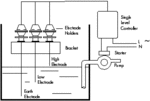
Control of 1 pump/valve between 2 levels fixed by length of electrodes.
Control of 1 pump/valve between 2 levels fixed by length of electrodes.
Using a fixed probe system means there are no moving parts to jam or go wrong.
Cut the electrodes at the point where you want something to happen
If there is any insulation on the electrodes strip back about 50 mm ( 2 inches) and expose the bare metal underneath.
Ensure you have an earth return. This can be the metal tank or the submersed pump or another electrode. If using an earth electrode it must always be the longest electrode in the tank. But it only needs to be slightly longer than the next electrode.
Remember to use the Hawker level controller which is the brains to make a repeatable reliable system.It is designed to ignore electrode contamination.
If you would like to see a video clip about the controller's ability to ignore ragging then follow this link http://www.youtube.com/watch?v=63z8LmPD4ks and if you would like to see a video clip about the controller's ability to ignore foam then follow this link
http://www.youtube.com/watch?v=Z9URP0B-4I8

Pump and Valve Control a using multi holder
Control of 1 pump/valve between 2 levels fixed by electrode lengths using multi holder
A multi electrode holder is an ideal space saver and it cuts down on the installation costs. However you should only use a Multi electrode holder for clean liquids
Hawker Electronics can offer you a range of multi holders for small sumps and double skinned vessels up to larger tanks.
We can offer a range of electrode for chemical applications.
The principle is exactly the same as single electrode holders in that you need to have active electrodes for on/off control or open/close valves or high/low alarms.
Some multiholders can have up to 5 electrodes to give you for example pump control plus high and low alarm or 2 pump control plus high alarm.
Using a fixed probe system means there are no moving parts to jam or go wrong.
Cut the electrodes at the point where you want something to happen
If there is any insulation on the electrodes strip back about 50 mm ( 2 inches) and expose the bare metal underneath.
Ensure you have an earth return. This can be the metal tank or the submersed pump or another electrode. If using an earth electrode it must always be the longest electrode in the tank. But it only needs to be slightly longer than the next electrode.
Remember to use the Hawker level controller which is the brains to make a repeatable reliable system.It is designed to ignore electrode contamination.
If you would like to see a video clip about the controller's ability to ignore ragging then follow this link http://www.youtube.com/watch?v=63z8LmPD4ks and if you would like to see a video clip about the controller's ability to ignore foam then follow this link
http://www.youtube.com/watch?v=Z9URP0B-4I8
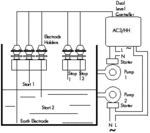
Control of 2 pumps or valves - Filling
Control of 2 pumps/valves fixed by electrode lengths. Filling mode using dual controller type AC3/HH
Using a fixed probe system means there are no moving parts to jam or go wrong.
Cut the electrodes at the point where you want something to happen
If there is any insulation on the electrodes strip back about 50 mm ( 2 inches) and expose the bare metal underneath.
Ensure you have an earth return. This can be the metal tank or the submersed pump or another electrode. If using an earth electrode it must always be the longest electrode in the tank. But it only needs to be slightly longer than the next electrode.
Remember to use the Hawker level controller which is the brains to make a repeatable reliable system.It is designed to ignore electrode contamination.
If you would like to see a video clip about the controller's ability to ignore ragging then follow this link http://www.youtube.com/watch?v=63z8LmPD4ks and if you would like to see a video clip about the controller's ability to ignore foam then follow this link
http://www.youtube.com/watch?v=Z9URP0B-4I8
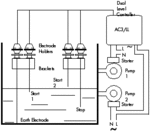
Control of 2 pumps/valves - emptying
Control of 2 pumps/valves at levels fixed by electrode lengths. Emptying mode using dual controller type AC3/LL
Using a fixed probe system means there are no moving parts to jam or go wrong.
Cut the electrodes at the point where you want something to happen
If there is any insulation on the electrodes strip back about 50 mm ( 2 inches) and expose the bare metal underneath.
Ensure you have an earth return. This can be the metal tank or the submersed pump or another electrode. If using an earth electrode it must always be the longest electrode in the tank. But it only needs to be slightly longer than the next electrode.
The best position is to place the earth electrode is in the middle of the collection of the electrodes to improve performance.
Remember to use the Hawker level controller which is the brains to make a repeatable reliable system.It is designed to ignore electrode contamination.
If you would like to see a video clip about the controller's ability to ignore ragging then follow this link http://www.youtube.com/watch?v=63z8LmPD4ks and if you would like to see a video clip about the controller's ability to ignore foam then follow this link
http://www.youtube.com/watch?v=Z9URP0B-4I8
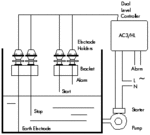
Pump Control plus High Alarm - Emptying
Control of 1 pump and 1 high level alarm at levels fixed by electrode lengths using dual controller type AC3/LH
Using a fixed probe system means there are no moving parts to jam or go wrong.
Cut the electrodes at the point where you want something to happen
If there is any insulation on the electrodes strip back about 50 mm ( 2 inches) and expose the bare metal underneath.
Ensure you have an earth return. This can be the metal tank or the submersed pump or another electrode. If using an earth electrode it must always be the longest electrode in the tank. But it only needs to be slightly longer than the next electrode.
The best position is to place the earth electrode is in the middle of the collection of the electrodes to improve performance.
Remember to use the Hawker level controller which is the brains to make a repeatable reliable system.It is designed to ignore electrode contamination.
If you would like to see a video clip about the controller's ability to ignore ragging then follow this link http://www.youtube.com/watch?v=63z8LmPD4ks and if you would like to see a video clip about the controller's ability to ignore foam then follow this link
http://www.youtube.com/watch?v=Z9URP0B-4I8
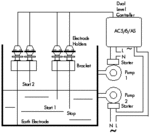
Two Pump controller with sequencing
Control of 2 pumps/valves between 2 levels fixed by electrode lengths. With facility to change the starting order every cycle.
This dedicated 2 poump controller will operate as a duty/standby system or a duty/assist system and the customer can select the preferred option. Thereis also a facility to give a signal when the second pump is called to run.
This a simple system designed for pumping stations
Using a fixed probe system means there are no moving parts to jam or go wrong.
Cut the electrodes at the point where you want something to happen
If there is any insulation on the electrodes strip back about 50 mm ( 2 inches) and expose the bare metal underneath.
Ensure you have an earth return. This can be the metal tank or the submersed pump or another electrode. If using an earth electrode it must always be the longest electrode in the tank. But it only needs to be slightly longer than the next electrode.
The best position is to place the earth electrode is in the middle of the collection of the electrodes to improve performance.
Remember to use the Hawker level controller which is the brains to make a repeatable reliable system.It is designed to ignore electrode contamination.
If you would like to see a video clip about the controller's ability to ignore ragging then follow this link http://www.youtube.com/watch?v=63z8LmPD4ks and if you would like to see a video clip about the controller's ability to ignore foam then follow this link
http://www.youtube.com/watch?v=Z9URP0B-4I8
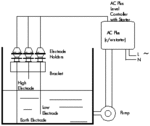
Pump controller with motor starter equipment
Control of 1 pump/valve between 2 levels fixed by electrode length. This unit is c/w motor starter unit, type AC Plus
A control cabinet containing the level controller and the pump starter.
This system can be designed to your exact needs with override switches and pump running lights and audible and visual alarms
Using a fixed probe system means there are no moving parts to jam or go wrong.
Cut the electrodes at the point where you want something to happen
If there is any insulation on the electrodes strip back about 50 mm ( 2 inches) and expose the bare metal underneath.
Ensure you have an earth return. This can be the metal tank or the submersed pump or another electrode. If using an earth electrode it must always be the longest electrode in the tank. But it only needs to be slightly longer than the next electrode.
The best position is to place the earth electrode is in the middle of the collection of the electrodes to improve performance.
Remember to use the Hawker level controller which is the brains to make a repeatable reliable system.It is designed to ignore electrode contamination.
If you would like to see a video clip about the controller's ability to ignore ragging then follow this link http://www.youtube.com/watch?v=63z8LmPD4ks and if you would like to see a video clip about the controller's ability to ignore foam then follow this link
http://www.youtube.com/watch?v=Z9URP0B-4I8

Borehole pump controlled from electrodes in break tank
Borehole pump controlled from electrodes in break tank. Low level protection for borehole pump from electrodes suspended in borehole, stopping on lower electrode and starting when water level recovers to higher level
A break tank will call for water from the borehole. But it is important that the water abstraction from the borehole can cope with the demand.
A borehole electrode will protect the borehole pump from dry running
In the break tank electrodes will call for water to keep the break tank topped up.
A low level probe can be used to send an alarm to warn of low level in the break tank

remote borehole applications
Arrangement when break tank is remote
Control of 2 levels in borehole fixed by suspended borehole electrode. Pump controlled by level in Remote break tank.
Borehole pump stops on high pressure restarts when ball valve re-opens after suitable time delay.
Time clocks can be incorporated in these systems to limit pump running to low tariffs.
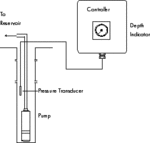
Borehole application using a Pressure transducer
Indication of water level in borehole using pressure transducer can be incorporated in above systems.
Lvel probes give point level detection. Sometimes continuous level indication is required so a mixture of level probes and a pressure transducer can be used.
The pressure transducer will give a continuous output signal for the calibrated depth of liquid and the signal will be either a millivolt or a milliamp signal. Nowadays most people prefer to use a milliamp signal in the range of 4 - 20 milliamps.
This output signal can be connected to a signal conditioning module to allow it to be respanned or into a trip amplifier to control pumps and give alarms or to a BMS system.









